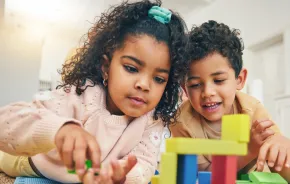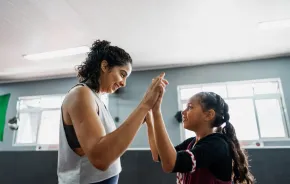
There are topics we find hard to bring up with our children because they are embarrassing, we don’t know what to say or we don’t have the answers and think we should. Then there’s talking to kids about divorce. The pain, anguish and guilt many parents feel around what divorce will mean to their kids can stop them in their tracks.
But divorce happens. No matter how much commitment and work go into an intimate relationship, sometimes we cannot sustain that connection through the stress of life. I work frequently with parents who have decided to separate or divorce and are wondering how it might impact their kids. If you’re in this tough situation, here are some tips to ease your pain — and your children’s.
1) Don’t stay just for the kids. Parents commonly believe that they must stay together for the sake of the children. Of course, we don’t want to cause our children pain, so this seems like a logical decision. The problem is: You and your partner are modeling for your kids what a healthy relationship looks like, and how you care for yourself is how they will learn to care for themselves as adults. So if you are certain you will divorce and are just waiting for the kids to get older, pay attention to what kind of message that might send them. Life is full of loss. The idea is not to protect your children from experiencing any, but to be there for them when they do.
2) Ask for help. I highly encourage divorcing parents to meet with a professional to work out how to communicate in a respectful way. This also helps both partners get on the same page around the new logistics of co-parenting from two homes. Parents may be adversaries in their adult relationship, but the best thing they can do for their children is parent as a team. Parent coaches, counselors and mediators help divorcing and divorced parents learn how to set aside their adult relationship issues enough to minimize the impact on their children.
3) Support your children. Even young children may benefit from having a place of their own to get support. This may come from other adults your child is close with or feels comfortable talking to, or it may mean time with a counselor. Child therapists help kids process their feelings in healthy ways, so they can move through the transition with less trauma now and fewer behavioral problems later.
4) The kids are alright. Kids can — and do — survive divorce just fine. The biggest impact on how they adjust is how well the parents handle their relationship problems without involving the kids. Children need to know that both parents love them enough not to put them in the middle. Often parents do not realize the subtle negative messages they send about the other partner, which can be devastating to children.
5) Stabilize what you can. Try to minimize disruptions to your child’s normal life. If possible, do not physically move the child to a new home right away. Home is what they know, and though one parent may not be there, at least they are in a familiar place. Keep their bedtimes, mealtimes, activities, social time, school and so on as stable as possible. Make sure they have plenty of time with other adults (and children) they love and trust, too.
While divorce is never something we want our children to experience, children can not only survive but grow through the process. When kids (and grownups) face a challenging situation, big or small, we learn that we can have difficult feelings and move through them. We develop resilience in the face of adversity; we develop courage when we face our fears.
The most important thing you can do as a parent is allow your kids to experience their emotions. Your ability to care for yourself will model for your children that life may be hard sometimes, but with love and support, we come out stronger on the other side of struggle.











